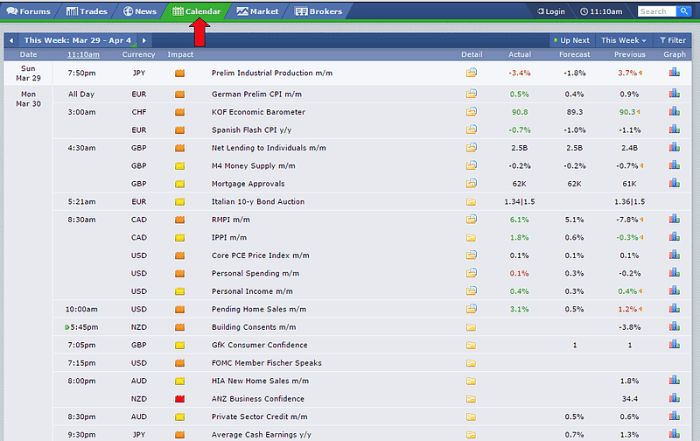The ethical considerations of using Forex Factory data in trading – Forex Factory Data: Ethical Trading Considerations – Navigating the murky waters of ethical trading using publicly available data like that from Forex Factory requires careful consideration. This isn’t just about avoiding legal trouble; it’s about ensuring fair and sustainable market practices. We’ll explore the key ethical dilemmas faced by traders who leverage this resource, examining everything from data acquisition rights to the potential for market manipulation.
This exploration will delve into the legal and ethical implications of using Forex Factory data, analyzing potential biases, the reliability of the information, and the impact of algorithmic trading strategies. We’ll also discuss transparency, disclosure, and the responsibility traders have to other market participants. The goal? To provide a practical framework for ethical decision-making in the world of forex trading.
Algorithmic Trading and Fairness

Algorithmic trading, especially high-frequency trading (HFT), presents unique ethical challenges when leveraging publicly available data like that found on Forex Factory. The speed and scale at which these algorithms operate can create significant advantages, raising concerns about market fairness and equal opportunity for all participants. This section explores these concerns and proposes a framework for ethical evaluation.The use of Forex Factory data in algorithmic trading strategies introduces several potential ethical concerns.
The platform provides a wealth of information, including news, sentiment indicators, and economic calendar events, often before it’s widely disseminated. Algorithms can process this data far faster than humans, potentially leading to situations where a small group of traders with sophisticated algorithms gain an unfair advantage.
Check what professionals state about how to measure the ROI of your social media marketing efforts and its benefits for the industry.
Potential Ethical Concerns in Algorithmic Forex Trading
Algorithms designed to exploit even minor time lags in data dissemination can create an uneven playing field. For instance, an algorithm reacting to news posted on Forex Factory milliseconds before it hits mainstream news outlets could execute trades at more favorable prices, generating profits at the expense of slower traders. This speed advantage isn’t based on superior market analysis but on technological superiority and access to data distribution infrastructure.
Another concern arises from the potential for algorithms to manipulate market sentiment by strategically placing orders based on observed trends on Forex Factory, artificially inflating or deflating prices to trigger pre-programmed trades.
Examples of Unfair Advantages
Imagine two traders: one using a sophisticated algorithm that scans Forex Factory for news and economic data, and another relying on traditional methods. The algorithmic trader could execute trades based on that information before the other trader even sees the news, leading to consistently better trade execution and profitability. This isn’t simply a matter of skill; it’s a structural advantage stemming from technology and data access.
Similarly, an algorithm could detect a shift in sentiment on Forex Factory forums and use this information to front-run large institutional orders, again gaining an unfair edge.
Framework for Evaluating Ethical Implications of Automated Trading Systems
A robust framework for evaluating the ethical implications of automated trading systems should consider several key factors. First, the speed and efficiency of data processing should be assessed. Does the algorithm exploit time lags in data dissemination to gain an unfair advantage? Second, the algorithm’s impact on market transparency and liquidity needs examination. Does it contribute to market manipulation or instability?
Third, the accessibility and affordability of the technology should be considered. Is the technology only accessible to a select group of wealthy or technologically advanced traders? Finally, the algorithm’s overall impact on market fairness and equal opportunity for all participants must be evaluated.
Comparison of Algorithmic Trading Strategies and Ethical Implications
The ethical implications of algorithmic trading strategies vary significantly depending on their data source and methodology.
- Strategies relying solely on publicly available data (like Forex Factory): These strategies, while potentially leading to some speed-based advantages, are generally considered less ethically problematic than those using proprietary or non-public data.
- Strategies incorporating both public and proprietary data: These strategies raise greater ethical concerns as the combination of data sources can create a more significant informational advantage.
- Strategies employing high-frequency trading (HFT) techniques: HFT algorithms, particularly those exploiting microsecond latency advantages, raise significant ethical concerns regarding market fairness and manipulation, regardless of the data source.
Market Manipulation and Insider Information: The Ethical Considerations Of Using Forex Factory Data In Trading

Forex Factory, while a valuable resource for forex traders, presents ethical challenges when its data is misused. The platform’s real-time information, including news, economic calendars, and user sentiment, can be easily leveraged to manipulate the market or gain an unfair advantage, raising significant ethical concerns. Understanding these risks is crucial for maintaining market integrity and acting responsibly as a trader.The misuse of Forex Factory data can contribute to market manipulation through coordinated actions that artificially inflate or deflate prices.
For instance, a group of traders might use the platform’s sentiment analysis to identify a currency pair with overwhelmingly negative sentiment. They could then collectively sell that currency, driving the price down further, creating a self-fulfilling prophecy and profiting from the resulting price movement. This coordinated action, fueled by Forex Factory data, artificially manipulates the market and undermines its fair functioning.
Examples of Potential Insider Trading Scenarios
Using Forex Factory data could be construed as insider trading if a trader exploits non-public information gleaned from the platform to gain an unfair advantage. Imagine a scenario where a major bank’s trader leaks confidential information about an upcoming interest rate decision onto Forex Factory through a seemingly innocuous comment or post. Other traders who monitor Forex Factory could then act on this leaked information before the official announcement, resulting in significant profits at the expense of other market participants who lack access to this privileged information.
Browse the multiple elements of how to delegate tasks effectively in a digital marketing agency to gain a more broad understanding.
This would constitute insider trading, a serious violation of market regulations. Another scenario involves a user posting accurate, yet unreleased, economic data on Forex Factory before its official publication, giving a small group of traders who monitor the platform an unfair advantage.
Ethical Responsibilities of Traders
Traders have an ethical responsibility to ensure their trading activities do not manipulate market prices or give them an unfair advantage. This includes refraining from coordinated actions based on information shared on Forex Factory, and refraining from using the platform to disseminate or act upon confidential information. Transparency and fair play are paramount; using Forex Factory’s data should be limited to informed decision-making, not market manipulation.
Adherence to regulatory guidelines and professional codes of conduct is also essential in mitigating ethical risks associated with the platform’s use.
Ethical Considerations in Interpreting User Comments and Sentiment Analysis
Interpreting and acting upon information derived from Forex Factory’s user comments and sentiment analysis requires careful ethical consideration. While sentiment analysis can provide insights into market sentiment, it’s crucial to recognize the potential for bias, manipulation, and misinformation. Relying solely on user comments without independent verification can lead to flawed trading decisions and potentially contribute to market instability. A responsible trader would critically evaluate user comments, considering the potential for manipulation or misinformation before making any trading decisions.
Over-reliance on subjective opinions expressed on the platform, without corroboration from reliable sources, is ethically questionable.
Transparency and Disclosure

Using Forex Factory data in your trading strategies raises important ethical questions, especially concerning transparency. Openness about your data sources builds trust and avoids accusations of manipulative behavior. It’s crucial to understand that while the data itself is publicly available, how you use it significantly impacts ethical considerations.Transparency in disclosing the use of Forex Factory data is paramount for maintaining integrity in the financial markets.
Failing to be upfront about your reliance on this or any other publicly available data source can lead to misunderstandings and erode the trust necessary for fair and efficient trading. It also protects you from potential accusations of misrepresentation or even market manipulation.
Examples of Ethical Disclosure
Traders can ethically disclose their reliance on Forex Factory data in several ways. For example, in a trading journal or blog, clearly stating “This strategy utilizes publicly available sentiment data from Forex Factory” is sufficient. If presenting trading results, including a brief explanation of the data sources used adds context and credibility. Academic papers or presentations analyzing trading strategies should meticulously document all data sources, including Forex Factory.
Similarly, any publicly shared trading algorithms or systems should transparently acknowledge their dependence on Forex Factory’s data. In essence, proactive and clear communication about data sources is key.
Ethical Implications of Concealing Forex Factory Data Use
Concealing the use of Forex Factory data in trading performance reporting is ethically problematic. It creates a false impression of skill or predictive ability, potentially misleading others. Omitting this information could be interpreted as an attempt to inflate results or misrepresent the strategy’s true nature. This lack of transparency undermines the trust and integrity of the market. Furthermore, it can damage a trader’s reputation if discovered, leading to a loss of credibility and potential legal ramifications.
Consider the scenario where a trader boasts exceptional returns without mentioning their heavy reliance on Forex Factory’s sentiment data; this could be viewed as deceptive, particularly if the data played a significant role in the strategy’s success.
Ethical Considerations Checklist for Traders Using Forex Factory Data
The following checklist summarizes ethical considerations when using Forex Factory data. Remember, transparency is key to maintaining integrity in your trading practices.
| Aspect | Ethical Consideration |
|---|---|
| Data Acquisition | Always obtain data legally and ethically; respect Forex Factory’s terms of service. |
| Data Use | Clearly define how Forex Factory data is integrated into your trading strategy. |
| Performance Reporting | Transparent reporting of data sources used in achieving trading performance. |
| Public Disclosure | Openly acknowledge the use of Forex Factory data in any public presentations or publications. |
Impact on Other Market Participants

Using Forex Factory data, a popular source of forex market sentiment and news, can significantly impact other market participants. The accessibility and potentially time-sensitive nature of this information creates a playing field that isn’t perfectly level, raising ethical questions about fair access and potential for manipulation. The effect varies depending on the size and resources of the trader, leading to different ethical implications.The potential for unfair advantage is a key concern.
Faster access to information, even fractions of a second, can translate to significant profits in the fast-paced forex market. This advantage is amplified when considering the differing capabilities of individual traders compared to large institutional investors.
Individual Traders versus Institutional Investors
Individual traders often rely heavily on publicly available information like that found on Forex Factory. For them, the speed and accuracy of accessing and interpreting this data can be a crucial factor in their trading success. Conversely, institutional investors typically have access to a wider array of data sources, sophisticated analytical tools, and dedicated research teams. This disparity creates an uneven playing field, where institutional investors might leverage Forex Factory data more effectively, further widening the gap between them and smaller traders.
The ethical implication here lies in the inherent imbalance of resources and the potential for larger firms to exploit this information asymmetry to the detriment of smaller participants. One could argue that the use of Forex Factory data by institutional investors is not inherently unethical, but its potential for disproportionate impact on smaller traders needs careful consideration.
Potential Conflicts of Interest, The ethical considerations of using Forex Factory data in trading
Using Forex Factory data presents potential conflicts of interest. For example, a trader who publishes analysis or forecasts on Forex Factory might simultaneously use that same information for their personal trading, creating a conflict between their role as an information provider and their role as a trader. This can lead to unfair advantages, as they could manipulate the information presented to benefit their personal trades.
Furthermore, if a large institutional investor uses Forex Factory data to influence the market, potentially creating artificial price movements, this can negatively impact other market participants who are not privy to the same information or resources.
Examples of Unfair Outcomes
Imagine a scenario where a large hedge fund uses Forex Factory’s news and sentiment data to anticipate a significant price movement in a currency pair. Their advanced algorithms quickly process this information, allowing them to execute trades milliseconds before the information becomes widely available to other traders. This allows the hedge fund to profit significantly at the expense of those who react to the news later.
Another example could involve a trader who strategically posts misleading information on Forex Factory’s forums to influence market sentiment and profit from subsequent price movements. This manipulation directly harms those who rely on the forum’s information for their trading decisions. These scenarios highlight the potential for unfair outcomes resulting from the unequal access to and interpretation of information found on Forex Factory.
Ultimately, responsible use of Forex Factory data hinges on a commitment to fairness, transparency, and a deep understanding of the potential consequences of one’s actions. While the data itself is publicly accessible, the ethical considerations surrounding its use are complex and require ongoing vigilance. By understanding these ethical dimensions, traders can navigate the forex market with integrity, contributing to a more robust and equitable trading environment for everyone.